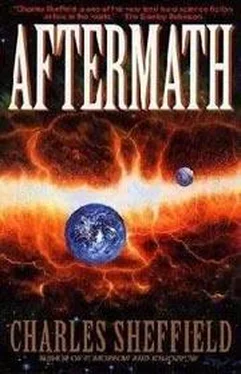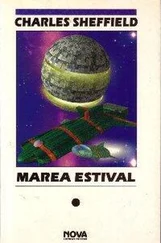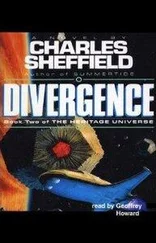“I agree.” Saul wondered at the line of logic. Nick Lopez was a dedicated isolationist, while Sarah Mander hated not just blacks, Hispanics, Jews, and Native Americans, but every foreign group that came into her sights. “What are you suggesting? I hope you are not proposing to resuscitate the foreign aid program. It ruined every country that ever received it.”
As he was speaking, Saul realized that he knew quite well where Lopez was going. His own mention of foreign aid was a way of marking time, thinking the idea over — and rejecting it.
“Foreign aid, never.” Lopez’s face in repose showed a natural easygoing good humor, part of his success as a politician. The fire and conviction that sat on it now was something that no voter would ever see. “Mr. President, we can offer something much better. We, the United States, are in a position to assume a more central role in the world. We have an opportunity that may never arise again, to assert global dominance. Our military has overwhelming superiority. Our food reserves form an invaluable asset. We will soon once more have working communications, a strong infrastructure, and a stable government. We cannot lose — and people everywhere in the world will bless us for rescuing them from barbarism.”
“You paint an attractive picture, Senator. And a plausible one.”
And who would lead that global empire? Saul knew the answer — and he felt the lure in his bones.
“With you as leader.” Sarah Mander was reading his mind. She wore the inviting smile of a Siren. “President Saul Steinmetz. First President of — may I say it? — the United States of the World.”
President Steinmetz. And, as a reward for their initiative and support, positions of global power and influence for Sarah Mander and Nick Lopez. After that, presumably, a voice in the succession.
“I’m not sure I’d look good on a gold coin.” Saul, deliberately, moved the level of intensity down a couple of notches. He tapped his nose. “I’m very fond of this, but it’s a bit too Semitic, don’t you think? Remember, I’m the man who goes to temple and gets pointed out as ’that Jewish-looking guy over there.’ Maybe in full face, rather than profile?”
He felt the relaxation. Since he did not reject their suggestion out of hand, they assumed he was thinking it over. They would not expect him to buy the idea at once — it was far too radical. And some of Lopez’s words raised other questions that really needed thought. Our military has overwhelming superiority. Had Lopez seen the rough airborne beasts slouching toward Andrews AFB and National Airport? What was the basis for such an assertion?
“If anything is to be done we must go beyond generalities,” Saul said at last. “We need a specific plan. Staffing levels, resources, schedules, approaches. Of course, we can’t do anything concrete until our own crisis eases. And I will need full congressional approval.”
The exchange of glances came and went in the flicker of an eye.
“Of course.” Lopez stood up. “This meeting was no more than a preliminary discussion of principles. An enormous amount of work remains to be done. However, we think we can guarantee you the overwhelming support of both Houses.”
In other words, we did our homework. But Saul could have guessed that. There had to have been the usual backroom quid pro quos, although he did not know the details and the stakes were bigger than usual. You have my support, provided that my wife’s family has control of Congo copper production? Or maybe, Offshore oil leases in Argentina, in exchange for three locked-in votes.
Saul stood up, too. “Our surveillance systems will give us a more accurate world picture within a week. We’ll know better then what has to be done. Why don’t we meet again in five days?”
The usual handshakes — firm and brisk from Nick Lopez, while Sarah Mander clasped Saul’s hand warmly in both of hers — and they were gone.
He smiled until they left, then sat and seethed. The witless bastards. A President had to be ambitious, sure, otherwise it would be the worst job in the world. He was certainly no exception. But every President also had an eye on posterity. What would people remember about you, a hundred or two hundred years from now?
Not, you hoped, that you had waited until the rest of the world was at a low point, then made a cheap power grab. Mander and Lopez were living in the wrong century. What they were proposing was some form of a Pax Americana. There was no way that such an entity could survive for very long, unless you were willing to grind the people of other countries into absolute servitude.
And probably not even then. It had been tried. You ran the risk of plagues of frogs and locusts and pools of blood, and the loss of your firstborn child.
Almost always, the moral high road was the right road, even if it was seldom the popular way.
Saul glanced at the portraits that lined the office wall.
He divided them into two groups: wrong but romantic, or right but repulsive. Sarah Mander would have told him in an instant the name of the book from which he had stolen the two categories. Nick Lopez might know, but he would deny the knowledge.
They both had a special interest in politics. How was a President usually remembered by the general public?
By trivia, some of them false.
You chopped down a cherry tree. You charged on horseback up a useless piece of real estate called San Juan Hill. You used a wheelchair. You were so fat you got stuck in the White House bathtub. You were as stingy with words as a miser with his gold. You recorded your own crimes — and kept the recordings. You rented bedrooms for one-nighters at the White House. You were shot in a motorcade, and set off the biggest conspiracy theory in history.
And Saul Steinmetz?
The first Jewish President, but the hell with that as a claim for immortality. Kennedy was the first Catholic President, Reagan the first divorced President. Who remembered them that way? No one.
Jewishness was merely an obstacle, a fence that he had already cleared on the way to the White House. What he needed was something as memorable as ending slavery, as important as bringing the nation out of the Depression. Suppose he put the country back on its feet now, and made it stronger and better than it had ever been? That might do it. His recent meeting would not make that job any easier.
He glanced toward the empty corner of the office where the Persona had once maintained its hologram, then he slid open a drawer of his desk and looked inside. A handsome face with long hair pushed Byronically back from the brow stared straight at him from the old painting. The Presidents on the wall were your predecessors, Saul; but I am your spiritual Papa.
Benjamin Disraeli had fought every one of Saul’s battles, and won, to become the Prime Minister of the biggest empire the world had ever known. And he had done it in a century where jew was a verb.
If Disraeli were here, what would he be doing now?
He would be asking his universal question. What if ?
What if Saul had given Sarah Mander and Nick Lopez a flat and immediate no?
They must have come prepared for such an answer. They would have alternate strategies able to neutralize or bypass Saul. For that to be possible, they needed a high-level insider within the White House itself. Preferably someone with detailed information on military strength and disposition.
The same question was in his head again: What did Sarah Mander and Nick Lopez know about the condition of the country’s military machine that Saul didn’t?
By definition, he could not answer that. Yet.
If Presidents had one common weakness, it was the disguised fondness for introspection. Saul roused himself and hit the intercom. When Auden Travis appeared — with his usual speed, and carrying a yellow folder -
Читать дальше












